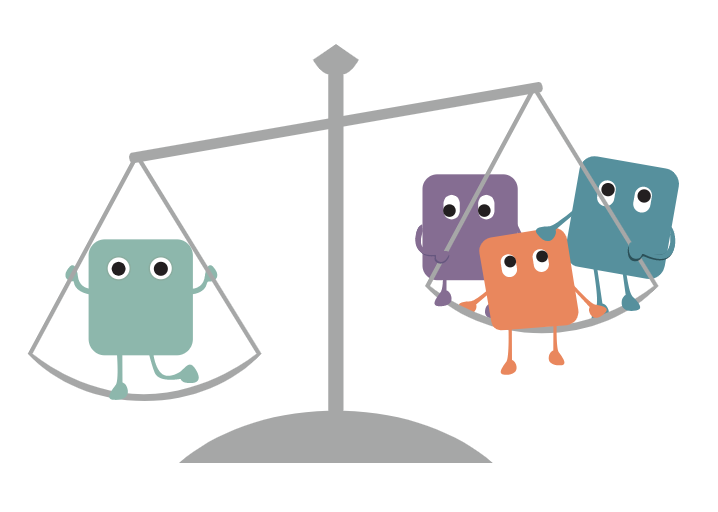The Problem of Perfect - how quality is hurting equality and what to do about it
Currently, I'm working on a small, low-hazard dam project that requires extensive data collection for geomorphic and submarine components known as bathymetric surveying. Because we're working on a dam, the trick is to survey when flows are low so that we can safely deploy a boat onto the river. At this point, we've created our survey specification about 6 times due to changing priorities, funding, and weather constraints. The usual. Each time we alter the document, we do internal quality checks through our intensive QAQC process. My coworkers are incredibly proud of producing this high caliber work.
An email just came through from my lead geotech on the latest version (Version #6). This time we've repackaged it so the client can implement with a LTC (long term contract) they already have executed. He's requested additional time to octuple check it, in detail, to make sure nothing has been lost in translation. A couple of hours at his billing rate is around $300 which is small change compared to the engineering fee. It's not even a hard decision for me as project manager: it's industry standard, it ensures reliable quality, and I need my geotech to feel comfortable sealing the drawing. I tell him to go ahead and get it to the client shortly.
But I often wonder if we're too focused on quality.
Because this is rework, we've already done this check at least 7 times before including sending to a QA reviewer the first time around. The dam itself is a low-head, low-hazard dam which is a classification to describe its triviality if it were to fail. And this isn't even for design of the dam, but surveying. Civil engineering has remarkable uncertainties in everything because of outside forces and unconstrainable variables. To sooth our anxiety with this uncertainty, we develop an auto-pilot response to over-analyze and ruminate on the problem, a tenant of perfectionism. It's become an industry-revered analytical response to an emotional problem.

Quality has a beloved place within the industry. We're agents of public and environmental safety and we wear that mantle seriously. We often forget that good does not have to be perfect. I like to characterize it by thinking of B+ work as having checked for design flaws, ensuring conformance with literature for current standards and processes, and satisfaction that the product meets the standard of care. It's not perfect but it's good enough.

Within our time constrained days, each time you recheck those CAD drawings you sacrifice a bit more productivity for a bit more performance. The balance is finding the threshold that has the most impact.
Matt Plumber and Jo Wilson argue that by focusing on productivity (quantity) you'll automatically be producing at the level with the most impact (HBR H04B8J 2018). I think this works well for engineers, scientists, and planners who already default to quality. It will ensure effectiveness of time investment to lean into the characteristic that is less natural for us.
Perfect is the Enemy of Good. ~Voltaire
Why a Goldilocks is better than a Hermione
For women in the work force, and especially white upper-middle class millennial women, we are often bringing with us the learned social habit of perfectionism, propagated by the accolades and validation we received for A+s from teachers and parents. Up until our first job in the "real world", we reinforce competence by letter-based grading standards. It's been well studied that girls in particular polish assignments to perfection, outperforming boys by 6.3% in all subjects.
Perfectionism is endemic to how girls are socialized. A study in the UK found that one-quarter of 7-10 year old girls felt they needed to be perfect. In academia this means that one-third of girls feel like they aren't smart, despite 4.0 GPAs. We begin to see the dark side of perfectionism where girls learn the behavioral value of perfectionism in school, beauty, and social circles, but it is inextricable from self-efficacy. It's no wonder that women have higher rates of anxiety and depression in the workplace (25% women, 15% men). Mental health issues are more ubiquitous with the younger generations who deal with more social pressure for perfectness (millennials) and lower risk tolerance (gen z).

Through my adolescence, Hermione Granger was a fan-favorite aspiration for grit, determination, and intelligence. She resonates with many future engineers and scientists. But while she may have time to produce 10 scrolls when Professor Binns only asked for 1, in the real world we have too many things pressing for our attention to mis-manage our time like that. We have work priorities, home priorities, and yes even relaxing and recharging priorities. We don't have time to ruminate on the last 10% of effort for minimal return. Yet in our current education system, we're rewarding perfectionism. The dark side emerges when this leads to elevated levels of stress and anxiety, the exact formula that makes it difficult for perfectionists to function.
A hidden double standard
At the leadership level a full half of women experience self-doubt, compared with a third of men, leading to the often-regarded feeling of imposter phenomenon. Some women feel like they aren't good enough until they're the top A+ performers. Women need to be 100% sure they meet all the qualifications to apply for a job compared with men who apply after meeting 50%, and then ask for 30% less than men. They're also expected to do more emotional labor and office housework, do 2.6 times more unpaid work and speak up less than men or else risk being disliked. Seriously. There was a study that showed that women who asked the same amount of questions as their male colleagues were perceived that they had less competence (Confidence Code). As NYT reporter says, "For [boys], school serves as a test track, where they build their belief in their abilities and grow increasingly at ease relying on them. Our daughters, on the other hand, may miss the chance to gain confidence in their abilities if they always count on intellectual elbow grease alone."
According to a 2009 US survey, all this high-achieving and functionality means that women are more likely to feel inadequate at home and the workplace, failing to meet their own standards and those imposed by others. In the work world, this translates to some women actively fighting self-criticism and socially prescribed criticism, a magnetic path towards perfectionism.Lately, perfectionism has gotten a bad rep in the workplace. Perfectionism is founded in a myopic failure to delegate because "I have to do this myself to get it done right" and a squashing of innovation and creativity when one views anything other than the "perfect" end goal as a failure. Engineers and scientists are disposed to this sort of cognitive behavior because we're always into the details, trying to perfect our designs. Meticulousness is confused with quality control. For women, this feeling may be accelerated due to our social fabric. The industry's insistence on quality, even when it's arbitrary to our end goal and has little impact, is adding an additional stressor borne by women.
D for Done
In reality, perfection is unattainable in our designs. The processes and standards we use may be out of date before the end of the product's design life. There's unknown or unexpected conditions that we can't always account for no matter how much we over-engineer. Reports we write up are often shelved and unread which can be demoralizing if its perfect quality is linked to how valuable we find ourselves. Yet as an industry we don't just see quality as an asset in our toolbox, but as the ultimate goal. The zenith of achievement and good work, regardless of the sacrifice to get to an unnecessary level of almost-perfection. We need to let go of perfect Hermione and instead get what's juuuust right if we're going to grow women in the industry.
Done is better than perfect. ~Cheryl Sandberg
My dad has a Bill-ism that he repeated to us all throughout college, "D for Done". I'd roll my eyes and continue to study. I thought if I'd just study hard enough I could squeeze out that 98% on the mechy mat final to get an A in the class. Spoiler alert: this Hermione could have done better things with her time.
In the case of the geotechs, the chance of them catching minor discrepancies in survey data locations will be caught in the RFI process. Or will be caught in the next round when we inevitably redo this assignment for Revision #7. In my experience, the things I have designed to perfection have been removed from the construction bid at the next go-round (sigh, I'm looking at you alkalinity feed system) or contractors made a change during construction so that it is more constructable or cost efficient.
Rewriting our societal and personal expectations around impact
In the mantra of high-quality and perfectionism, we lose productivity. In today's fast-paced digital world, it's been said that "time management is dead" because no one has time for everything, especially those tasks that are less impactful (HBR Reprint H009XU). The pressure to be perfect may be felt more by women, but it's also propagated by the mantra of our industry.
Quality is important and cannot be disregarded. But it needs to be intentional. By thinking in terms of impact, we can manage our projects for risk and uncertainty instead of pushing for a gender-biased performance characteristic. The more we are okay with good enough designs, the more willing analytical thinkers will be to let people with different ideas give theirs a go. The more voices we have at the table. And with that nuance we will intrinsically have more innovative ideas and solutions.
So how do we build the industry? We build confident men and women who know how to invest their time in impact, not quality.
How to be less than perfect:
Spend less time on emails that are internal. If needed follow-up with a phone call to reiterate or clarify something.
Don't document to perfection. A B+ meeting minute will be just as informative if you need to refer back to it for something.
Know that not every idea you have will be golden. Put a few ideas down first, then pick the best to move forward. Like they say in the tech world, "fail fast".
Focus on your time investment. What is the reward or result? Is it something that will be caught in the second go round? What will be the overall revenue, sales, or cash brought in?
Be kind with yourself. Find ways to let things with less impact slip.
Don't compare yourself to others.
Recognize that women ruminate more than men (making us better multitaskers but more prone to perfectionist-driven mental health issues). When you find yourself overthinking, ask yourself, "would a man do this?".
Delegate. Allow others to surprise you with how they've completed something.
Set project goals at the beginning and revisit them often. Was the goal to finish within 40 hours? Make sure that productivity part of the goal is judged just as much as the quality part of the goal. Revisiting the original goal will help you from altering the goal on the fly as a reaction to uncertainty.
How to have conversations with others:
Provide feedback based on impact, not quality or productivity alone.
Build confidence in the girls in your life. Encourage them to strive for impact.
Think about the WHY in what you're doing as Simon would say. Is the Why being met by the amount of work put in? Could you get away with something less?
Decouple worth from ability and perfectionism. Learn to be satisfied with good enough because it may never be perfect.
When talking to a perfectionist, disconnect your feedback about the quality of work from their overall worth. Reinforce their value based on their personality such as compassion, kindness, openness, collaboration. These conversations may be difficult but we need to be allies in breaking down our social norms.
Celebrate wins. This tells you and others that you are good enough even without perfectness.
Don’t require an "attention to details" in the job listing. It's an "attention to details when the job warrants it and the impact of that time investment is great". Or maybe just leave it off the listing and instead create one with the help of specialists that can describe gender-neutral job listings (yes this is a thing).
Do you have any other tips? What are they?
Reading: The Confidence Code. I found the title while doing this research. It was one of the vanguards discussing the confidence gap between men and women. It's written by journalists so it's an easy book to follow and is data-checked.
Working: I did my own vision quest last week with two of my mentors in Dallas. I sat down by thinking about what sort of projects give me validation (highly visible, community oriented, for community safety) and the sorts of things that get me excited for work (traveling for business, integrated with large teams of highly specialized people). My mentor C pushed me to consider what I want 5-10 years out which was an interesting conversation because I've always thought that planning was futile knowing how much my career changes! My favorite quote, "don't be a turd, be undeterred."
Listening: Michael Pollan's new book about mushrooms. It's thoroughly researched just like all his books. He even find guides and therapists to join as he trips. My favorite line was about how he was "slipping the acute bonds of plausibility". So many gems in the book. It then takes a scientific look on the research and psychedelics, exploring theories about how this chemical component divorces the brain from the ego. I'm excited to see where science takes this in the coming years.





